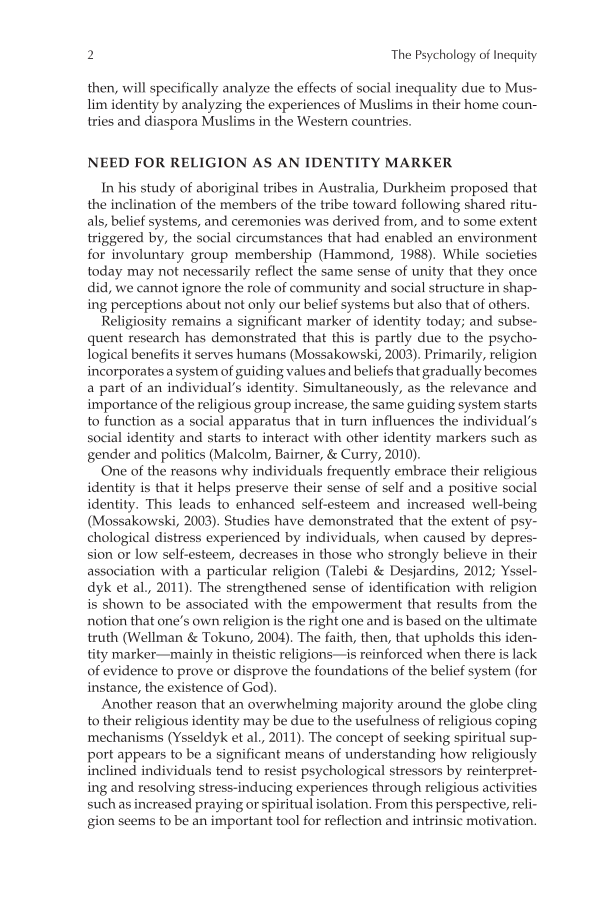2 The Psychology of Inequity then, will specifically analyze the effects of social inequality due to Mus- lim identity by analyzing the experiences of Muslims in their home coun- tries and diaspora Muslims in the Western countries. NEED FOR RELIGION AS AN IDENTITY MARKER In his study of aboriginal tribes in Australia, Durkheim proposed that the inclination of the members of the tribe toward following shared ritu- als, belief systems, and ceremonies was derived from, and to some extent triggered by, the social circumstances that had enabled an environment for involuntary group membership (Hammond, 1988). While societies today may not necessarily reflect the same sense of unity that they once did, we cannot ignore the role of community and social structure in shap- ing perceptions about not only our belief systems but also that of others. Religiosity remains a significant marker of identity today and subse- quent research has demonstrated that this is partly due to the psycho- logical benefits it serves humans (Mossakowski, 2003). Primarily, religion incorporates a system of guiding values and beliefs that gradually becomes a part of an individual’s identity. Simultaneously, as the relevance and importance of the religious group increase, the same guiding system starts to function as a social apparatus that in turn influences the individual’s social identity and starts to interact with other identity markers such as gender and politics (Malcolm, Bairner, & Curry, 2010). One of the reasons why individuals frequently embrace their religious identity is that it helps preserve their sense of self and a positive social identity. This leads to enhanced self-esteem and increased well-being (Mossakowski, 2003). Studies have demonstrated that the extent of psy- chological distress experienced by individuals, when caused by depres- sion or low self-esteem, decreases in those who strongly believe in their association with a particular religion (Talebi & Desjardins, 2012 Yssel- dyk et al., 2011). The strengthened sense of identification with religion is shown to be associated with the empowerment that results from the notion that one’s own religion is the right one and is based on the ultimate truth (Wellman & Tokuno, 2004). The faith, then, that upholds this iden- tity marker—mainly in theistic religions—is reinforced when there is lack of evidence to prove or disprove the foundations of the belief system (for instance, the existence of God). Another reason that an overwhelming majority around the globe cling to their religious identity may be due to the usefulness of religious coping mechanisms (Ysseldyk et al., 2011). The concept of seeking spiritual sup- port appears to be a significant means of understanding how religiously inclined individuals tend to resist psychological stressors by reinterpret- ing and resolving stress-inducing experiences through religious activities such as increased praying or spiritual isolation. From this perspective, reli- gion seems to be an important tool for reflection and intrinsic motivation.
Document Details My Account Print multiple pages
Print
You have printed 0 times in the last 24 hours.
Your print count will reset on at .
You may print 0 more time(s) before then.
You may print a maximum of 0 pages at a time.




































































































































































































































































